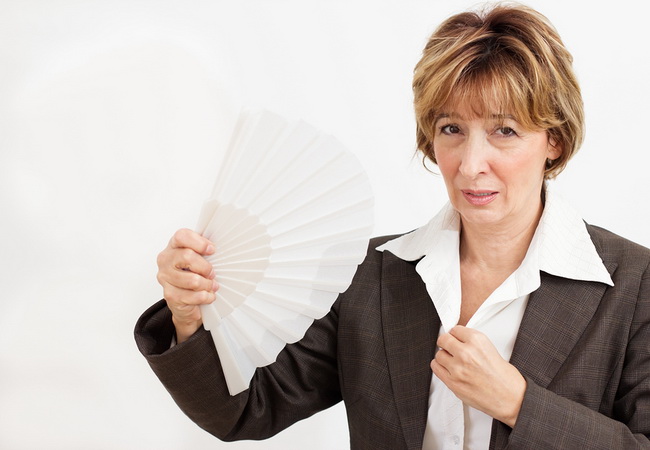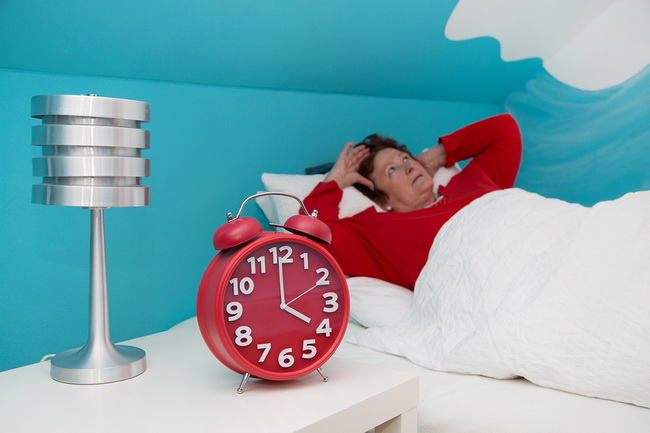- Make It Yourself Lavender Heart-Shaped Bath Bombs!
- 20 Things You Never Knew About “Down There”
- 12 Best Foods For Those Suffering From Arthritis Pain
- 12 Personal Hygiene Mistakes Almost Everyone Makes (Mom Never Told You About #4!)
- 15 Medicinal Plants And Herbs From The Cherokee People
- 12 Mind-Blowing Benefits Of Drinking Coconut Water During Pregnancy
- 12 Outstanding Winter Foods That Won’t Fatten You Up Like A Christmas Turkey
Top 5 Menopause Issues and How to Fix Them

Photo credit: bigstock
You gotta love being a woman. All those confusing hormones when you go through puberty, PMS symptoms, then the mood swings, paranoia, and cravings that come with pregnancy, and once you think you’ve got it all under control, here comes menopause!
If you are lucky, you will have a good doctor that will take your menopause symptoms seriously. Unfortunately, many doctors still hold onto outdated information, preconceived ideas, or they simply do not have the time to investigate your concerns.
So, chances are pretty good that, when it comes to figuring out what works for you and your menopause symptoms, you are going to have to go it alone.
Read on and become acquainted with how this change of life actually goes, what to expect, and means of dealing with it and not feel like you are going to lose your mind.
1. Your doctor doesn’t take your symptoms seriously or says HRT is your only solution
Both of these issues are a huge red flag that you need another doctor.
When your doctor listens to your complaints and says it sounds like PMS or “typical menopause problems”, and then writes you a prescription for anti-depressants, or tells you that hormone replacement therapy is the only thing they can do for you, you seriously need to get another doctor.
Although both hormones and anti-depressants are sometimes reasonable options to deal with these symptoms, they shouldn’t be the only or the automatic response to your problem. (Find out one anti-depressant side effects). If you leave your doctor’s office feeling that no one listened to you, or you don’t know what you should do to feel better, no matter how long you might have been seeing this doctor, get a new doctor or, at the very least, get a second opinion.
2. Sex isn’t fun anymore
If you feel like you just have no interest in sex anymore, or if sex actually hurts, this does not mean your sex life is over. There are tons of help available and, for many women; they find that sex after menopause is a new, exciting time of exploration and no worries about birth control!
In order to make sex fun again, you just need to make a few changes.
First, use lots of lubrication. There are some great, new lubricants made just for women going through menopause and although they cost a bit more, you will not be disappointed! Also, remember to give yourself a bit more time to get in the mood.
If you have been finding sex painful, simply change positions. Many women find deep penetration more painful than before but this only means you are now free to experiment with new positions.
If you are taking anti-depressants, either stop them or change them. An unfortunate side effect of many anti-depressants is lack of interest in sex, so if you think this might be your problem, talk to your doctor about changing medications.
Also, it helps to keep in mind that this particular problem is usually temporary. When your monthly hormone production stops, many women say that their libido goes into the deep freeze. However, over time, your adrenal glands will take control and start producing both male and female hormones and your libido will come back stronger than ever.
A last ditch approach is to take testosterone and/or androgen hormones. If you really can’t deal with little or no sex, talk to your doctor about the pros and cons of this type of therapy.
Continue to Page 2

Photo credit: bigstock
3. Your moods swings are like a rollercoaster!
This is really irritating, not only to you, but to your family and friends as well. First, for one month, try making a note of when you feel the most out of control and exactly what it is that is bothering you. Are you overly sensitive, crying all the time? Do you fly off the handle? Are you depressed or having anxiety attacks? Do you feel this way most of the time, or only certain days of the month?
Medications that might help you vary greatly and it will help you and your doctor if you know when and what feelings you are having. If you are feeling anxiety most of the time, you do not need something like Prozac, but perhaps just some short term therapy with Ativan.
However, if you are mainly feeling anger or irritability, you might find that yoga or dance classes help to relieve stress and anger. Read more about yoga poses to relieve stress.
If you are having those middle of the night my-mind-won’t-shut-off insomnia attacks, you can try making chamomile tea or valerian supplements.
Sometimes, anti-depressants are a godsend, but they do come with side effects that you should avoid if at all possible. If your symptoms are so severe that they are interfering with your life, and you and your doctor decide that anti-depressants are the answer, try Celexa. Research shows that not only does Celexa work better for women than for men; they also reduced hot flashes by as much as 50 percent! (Nice little bonus!) Try the minimum dosage first, sometimes; all your body needs is just a little help.
4. Hot flashes and night sweats
This is probably the most common, not to mention annoying, symptoms women complain about. They’re related but they aren’t the same thing. Some women have one but not the other, and that’s completely normal.
The reason for these symptoms is that when your natural hormone regulation system is overwhelmed, it appears to get confused and sends out signals to your body to dispel heat. Your body is simply confusing it’s signals and is overreacting to this. You can sometimes prevent this by avoiding things that seem to trigger these hot flashes and night sweats.
Take a look at the common things that tend to set off those hot flashes:
- Excessive sugar
- Caffeine
- Alcohol
- Saunas, Jacuzzis, and hot tubs
- Sex
- Spicy foods or hot sauces
- Intense exercise
- Acidic foods ( like tomatoes)
- Anger
- Stress or anxiety
There are two other things that can make a difference and that is to stop smoking, if you are a smoker, and losing weight. Both of these things increase hot flashes and night sweats immensely. Also, if you are a naturally nervous, anxious person, you will also suffer from more frequent bouts of hot flashes.
Try keeping a pitcher of ice water by your bed at night. If you wake up with those night sweats, drink a glass of ice water. Try dressing in layers, also, and when you think you feel a hot flash coming on, you can remove a few layers of clothing. Be sure you are getting sufficient amounts of vitamin D, magnesium, and calcium, as these have been known to reduce hot flashes. Sleep in a cool room with a fan running.
If none of these things help, and your hot flashes are intense, you might want to consider HRT.
Continue to Page 3

Photo credit: bigstock
5. You sleep poorly, can’t stay asleep, or can’t fall asleep
This is another common problem of menopause. What you really want to avoid here is taking sleeping pills as this is like going from the frying pan to the fire.
First, as we mentioned above, keep your bedroom cool and breezy. Run a fan that blows on your side of the bed (unless hubby likes the air, too!)
Put layers on the bed so you can remove them or add them without getting out of bed.
You should also make the room as dark as possible. Cover up digital clocks, use black out shades or heavy curtains, and turn off or cover up any source of light.
Try to keep a consistent sleep schedule. Although many people like to sleep in or stay up later on weekends, at this time in your life, things will work better if you have a set schedule.
Try getting a bit of exercise but not too much, and not at least two hours before bed. Don’t drink after 8PM to avoid trips to the bathroom and no caffeine after 6PM.
You should also avoid alcohol because even though it makes you feel sleepy, it tends to wake you up in the middle of the night.
Lastly, if you still don’t sleep well at night but feel sleepy during the day, try taking a nap.
6. Nothing seems to work but you don’t want to take hormones
People tend to have a very black or white view of hormones. You will hear women say how hormones saved their life or almost killed them. You can take the two key hormones, estrogen or progesterone, orally or as patches, or creams. You can take one or both, and in very different dosages. Then there are the bio identical hormones.
With so many options, what you will really need is a great doctor and lots of discussion. First you will want to discuss your cancer risks and your risk of heart disease. Then you need to discuss your family history. So if heart disease is chronic in your family, HRT is probably not a good idea for you.
Talk to your doctor and make sure that, no matter what choice you make, it’s an informed one and that your health will be monitored.
Sources:
































